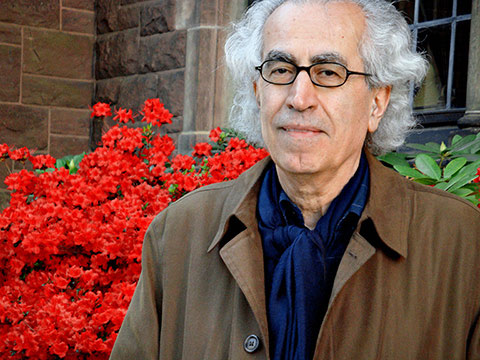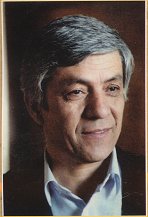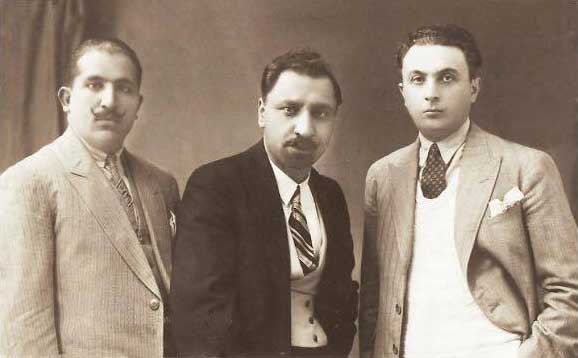Amir Hassanpour (1943-2017)
Amir Hassanpour (1943-2017)

Prof. Amir Hassanpour (Kurdish: Emír Hesenpúr, ئهمیر حهسهنپوور) was born in 1943 in Mahabad in Mukríyan Province in Kurdistan. He passed away at the age of 74 in June 2018 in Toronto, Canada. He did his primary school in Mehabad before he moved to Tehran for his secondary school at Dar-ol-Fonun Secondary School in 1961. He began his undergraduate studies in economics at University of Tehran (1961), and finished a B.A. in English language in 1964. He studied in Teacher’s Training College in Tehran (1965), and for a short time taught in the secondary schools of Mahabad in 1965-66. He was drafted into the Development and Extension Corp of the army and worked at the Land Reform office of Mahabad 1966-68.
In 1968, he began studying linguistics at Tehran University (M.A., 1970) and finished his doctoral work (ABD, 1972), while teaching for a year at the University of Tehran; he went to the university of Illinois in Urbana-Champaign, where he studied communications (Ph.D, 1989), sociolinguistics and contemporary Middle Eastern history.
Dr. Hassanpour moved to Canada in 1986, and taught communications studies at the University of Windsor and Concordia University in Montreal. He is now an Assistant Professor at the Department of Near and Middle Eastern Civilizations, University of Toronto. His research and teaching interests include international communication, Canadian communication and culture, broadcasting policy, communication theory, and Middle Eastern and Kurdish politics and culture.
He is the author of “Nationalism and Language in Kurdistan, 1918-1985” (San Francisco: Mellen Research University Press, 1992). He has made numerous contributions to academic journals, the Encyclopedia of Television, and Encyclopaedia Iranica.
Publications
Language & Literature
- “Kurdi wek zimaneki cut-standard” [Kurdish as a bi-standard language], Rojname [Iraq], No. 206, April 24, 2008, p. 11. [in Kurdish]
- “‘Ferhengî Zarekî’ le xulî têknolojî ziman da” (“’Oral Dictionary’ in the era of technologies of language), in Selah Payanyani (compiler), A Dictionary of Oral Mukri Kurdish/Ferhengî Zarekî Mukriyan, Vol. 1, Mahabad, Iran, Rahrav Publications, 2006, pp. 13-77
- “The tongue has no bone, but it breaks many bones,” Idea&s: The Arts & Science Review [Faculty of Arts & Science, University of Toronto], Autumn 2006, 3 (2), pp. 22-23;
- “Kurdish on death row,” Ideas: The Arts & Science Review [Faculty of Arts & Science, University of Toronto], 3 (2), pp. 32-35.
- “Kuristan’da Milliyetçilik ve Dil, 1918-1985“, (Istanbul, Avesta Publishers, 2005) translated by Ibrahim Bingol and Cemil Gundogan, (translation of Amir Hassanpour, Nationalism and Language in Kurdistan, 1918-1985. San Francisco: Mellen Research University Press, 1992).
- 2001 “The (re)production of patriarchy in the Kurdish language,” in Mojab, Shahrzad (ed.), Women of a Non-State Nation: The Kurds, Costa Mesa, CA, Mazda Publishers, pp. 227-63.
- “The politics of a-political linguistics: Linguists and linguicide,” in Robert Phillipson (ed.), Rights to Language: Equity, Power and Education, Mahawi, New Jersey, Lawrence Erlbaum Associates, In., Publishers, 2000 , pp. 33-39.
- 1999 “Language rights in the emerging world linguistic order: The state, the market and communication technologies,” in M. Kontra, R. Phillipson & T. Skutnabb-Kangas (eds.), Language: A Right and a Resource: Approaching Linguistic Human Rights. Budapest, Central European University Press, pp. 223-41.
- “Berengarî barî baw bûn: Awirrêk le jiyanî ‘Ebdulrrehmanî Zebîhî ‘ulema’ (1920-198?”)” [Resisting the “status quo”: A look at the life of AbdulRahman Zabihi “Ulama” (1920-198?)], in Ali Kerimi (ed.), Jiyan û Beserhatî ‘Ebdulrrehmanî Zebîhî ”Mamosta ‘Ulema,” Goteborg, Sweden, Zagros Media, pp. 15-51.
- “Berbîngî zimanî kurdî berbiden!” [Leave the Kurdish language alone!], in Ali Kerimi (ed.), Jiyan û Beserhatî ‘Ebdulrrehmanî Zebîhî ”Mamosta ‘Ulema” Goteborg, Sweden, Zagros Media, pp. 447-63.
- “The identity of Hewrami speakers: Reflections on the theory and ideology of comparative philology,” in Anthology of Gorani Kurdish Poetry, edited by A. Soltani, London, Soane Trust for Kurdistan, 1998 , pp. 35-49.
- “Edeb,” Encyclopædia Iranica, Vol. VIII, 1997, p. 174.
- “The non-education of the Kurds,” (with T. Skutnabb-Kangas & M. Chyet), International Review of Education (special issue: “Education of Minorities”), Vol. 42, No. 4, 1995, pp. 367-379, Translated into Turkish: “Kürtlerin eğitilmemesi: Kürdi bir perspektif” (“The education of the Kurds: A Kurdish perspective,” translated by Ömer Kurhan), Vesta, 2: 248-61, Winter 2004.
- “The internationalization of language conflict: The case of Kurdish,” in E. Fraenkel and C. Kramer (eds.), Language Contact-Language Conflict. New York: Peter Lang Publishing, 1993, pp. 107-55.
- “The pen and the sword: Literacy, education and revolution in Kurdistan,” in P. Freebody and A. Welsh (eds.), Knowledge, Culture and Power: International Perspectives on Literacy as Policy and Practice. London: The Falmer Press, pp. 23-54. Translated into Kurdish by Azad Sediq Mihemed in Êsta, No. 8, September 1997, pp. 14-27.
- “State policy on the Kurdish language: The politics of status planning,” Kurdish Times [New York], Vol. 4, No. 1-2, Summer/Fall, 1991, pp. 42-85.
History and Politics
- “Navad o sevumnin salgard-e zhenoside mellathaye Armani va Ashuri” [24 April 2008: 93rd anniversary of the genocide of Armenian and Assyrian nations], Shahrvand [Toronto], Vol. 17, No. 1147, April 24, 2008, pp. 5, 78-80. [in Persian]
- “Helebce duway bist salan” [Halabja twenty years later: Kurdistan as a ‘Zone of Genocide’] Part I: Kurdistan Report, No. 405, March 16, p. 6: Part II: No. 406, March 17, 2008, p. 6
- “Şerefname: Devletleşme, műlkilik ve egemenlik,” [Sharafnameh: state ormation, territoriality and sovereignty], Yazinca [Boğaziçi Űniversitesi, Edebiyat Kulűbű, Istanbul], translated by Onur Gűnay and Fırat Bozçalı, Sayi, 8, 2007, pp. 1-28. Reprinted as introduction to a new edition of Şerefname published by Avesta in Istanbul in 2008.
- Review of Hakan Ozoglu book, “Kurdish Notables and the Ottoman State: Evolving Identities,” Competing Loyalties, and Shifting Boundaries. (SUNY Series in Middle Eastern Studies. Albany: State University of New York Press, 2004. xv + 186 pp. Maps, notes, bibliography, index.) in H-Net Review (H-TURK)
- “The dangers of Iran’s Holocaust denial,” (with Shahrzad Mojab), Toronto Star, February 14, p. A17.
- “A Political-social movements. Ethnic and minority: Iran and Afghanistan,” in Encyclopedia of Women and Islamic Cultures (Leiden: Brill), Vol. 2, 2005, pp. 571-73.
- “Kurds”,@ Encyclopedia of Genocide and Crimes Against Humanity (Detroit: Macmillan Reference), Vol. 2, pp. 632-637.
- “Ninety Years Later: The Armenian Genocide Continues,” CTV.ca translated into French by Louise Kiffer: “90 ans plus tard, le génocide arménien se poursuit” (publié le : 11-05-2005)
- “Kurdish revolts”, @ Encyclopedia of the Modern Middle East and North Africa (Detroit: Macmillan Reference), Vol. 2, pp. 1339-42; AAbd al-Rahman Qasemlu,@
- “Kurdish diaspora”, (with Shahrzad Mojab), @ in Encyclopedia of Diasporas: Immigrant and Refugee Cultures Around the World (New York: Kluwer Academic, 2004), Vol. 1, 2004, pp. 214-24.
- “Tabligh-e nezhad-parasti va nefrat dar ghaleb-e ‘name-ye khanandegan’” [Propagating racism and hate under the guise of “letter to the editor”], Shahrvand (Toronto), No. 872, March 16, 2004, p. 2.
- “Mihan va melat-e Arya-i Tabligh-e nefrat va zhenosid”, @ [The Aryan homeland and nation: The propagation of hate and genocide], Shahrvand, Vol. 13, No. 886, May 7, 2004, pp. 3, 58, 60-62.
- “Negahi enteqadi be konfarans-e “adabiyat va khalaqiyat-e honari-ye zanan dar Iran” [A critical Glance at the conference on “Women’s Literary and Artistic Creativity in Contemporary Iran], Shahrvand (Toronto), No. 941, November 26, 2004.
- “Honour killing: Nationalist and (post)-modernist politics and perspectives,” Gzing: Cultural-Literary Kurdish Magazine, No. 37, Winter 2003, pp. 19-33. [in Kurdish]
- “Kurdewari, a patriarchal culture: An interview,” [in Kurdish], Gzing: Cultural-Literary Kurdish Magazine, No. 36, Fall 2003, pp. 10-18.
- “The making of Kurdish identity: Pre-20th century historical and literary sources,” in Abbas Vali (ed.), Essays on the Origins of Kurdish Nationalism. Costa Mesa, CA: Mazda Publishers, pp. 106-162.
- “Diaspora, homeland and communication technologies,” in Karim H. Karim (ed.), The Media of Diaspora: Mapping the Globe (Routledge, 2003), pp. 76-88.
- “Thoughts on the struggle against ‘honor killing’,” (with Shahrzad Mojab), The International Journal of Kurdish Studies, Vol. 16, Nos. 1 and 2, 2002, pp. 83-97.
- “The politics and culture of ‘honour killing’: The murder of Fadime Şahindal,” (with Sharzad Mojab), Pakistan Journal of Women’s Studies: Alam-e Niswan, Vol. 9, No. 1, 2002, pp. 57-77.
- “Berew têgeyiştin ű berberekanî kiridinî Enfal” (Towards understanding and resisting [the genocide of] Anfal), Anfal: A Documentation and Research Magazine, No. 1, 2000, pp. 10-20.
- “Kürt Diliyle Ilgili Devlet Politiklari ve Dil Haklar”, (State Policy on the Kurdish Language and Language Rights), translated by Cemil Gündo, Istanbul, Turkey, Avesta [Publications], 1997.
- “Review of Agha, Shaikh and State: The Social and Political Structures of Kurdistan”, (by Matin van Bruinessen, London, Zed Books, 1992) in Iranian Studies, Vol. 29, Nos 1-2, Winter-Spring, pp. 200-204.
- “Stalîn, qeyranî şorişî w rûxanî komarî azerbaycan û kurdistan” [Stalin, revolutionary situation, and the fall of Azerbaijan and Kurdistan republics], Gzing, No. 13, Fall, pp. 15-25.
- “The politics of nationality and ethnic diversity,” (with Sh. Mojab), in S. Rahnema and S. Behdad (eds.), Iran after the Revolution: Crisis of an Islamic State, London, I. B. Tauris, pp. 229-50.
- “Dimdim,” Encyclopædia Iranica, Vol. VII, Costa Mesa, California, Mazda Publishers, pp. 404-405.
- “The Kurdish experience,” Middle East Report, Vol. 24, No. 4 (189), July-August, 1994, pp. 2-7, 23.
- Review of “Azerbaijan: Ethnicity and Autonomy in Twentieth-Century Iran”, (by T. Atabaki, London: The British Academic Press, 1993), in CIRA Newsletter, Vol. 10, No. 1, pp. 10-12.
- Review of “A People Without a Country: The Kurds and Kurdistan” (ed., Gerard Chaliand, New York, Olive Branch Press, 1993), in Middle East Journal, Vol. 48, No. 4, pp. 731-32.
- Review of “The Kurds of Iraq: Tragedy and Hope” (Michael Gunter, New York, St. Martin’s Press, 1992), in Middle East Studies Association Bulletin, Vol. 28, No. 1, July, pp. 90-91.
- “Kurdish studies: Orientalist, positivist and critical approaches,” review article in Middle East Journal, Vol. 47, No. 1, pp. 119-122; rejoinder, Ibid., Vol. 47, No. 3, 1993, pp. 572-76.
- Review of “The Kurds: A Concise Handbook” ( by M. Izady, Washington: Crane Russak, 1992) in CIRA Newsletter, Vol. 9, No. 1, 1993, pp. 14-16.
- “Nationalism and Language in Kurdistan, 1918-1985“, San Francisco: Mellen Research University Press, 1992.
- “Bayt [popular ballad],” “Bukan,” and “Çahriq,” Encyclopædia Iranica, London: Routledge & Kegan Paul, Vol. IV, 1989, pp. 11-12, 511, 644-45.
- “Bahdinan” and “Baradust,” Encyclopædia Iranica, London: Routledge & Kegan Paul, Vol. III, 1988, pp. 485, 739-40.
- “Kurdistan Missionary’–unikt historiskt dokument,” Svensk-Kurdisk Journal [Stockholm], Nr. 8, 1987, pp. 16-18.
Media and Culture
- “Tab’id va teknolozhi-ye ertebatat” (Exile and communication technologies), Arash (Persian language magazine, Paris), No. 100, 2007, pp. 368-61.
- In Encyclopedia of Television, H. Newcomb (ed.), Chicago, Fitzroy Dearborn Publishers, Second Revised Edition, 2005:
- “Captioning,” Vol. 1, pp. pp. 452-533
- “Dubbing,” Vol. 1, pp. 764-65
- “Language and television,” Vol. 2, pp. 1313-18
- “Subtitling,” Vol. 3, pp. 2219-21
- “Voice-over,” Vol. 3, p. 2456.
- “Images of war and the war of images, @ Daylight Magazine [New York], No. 2., Summer 2004, pp. 54-55.
- “Diaspora, homeland and communication technologies,” in Karim H. Karim (ed.), The Media of Diaspora: Mapping the Globe, Routledge, 2003, pp. 76-88.
- “Lapdogs or watchdogs,” University of Toronto Bulletin, Vol. 56, No. 16, April 7, 2003, p. 11.
- In Encyclopedia of Modern Asia, Berkshire Reference Works/Scribners, 2002, USA:
- “Language purification,” Vol. 3, p. 442
- “Mass media –West Asia,” Vol. 4, pp. 114-15
- “Self-censorship,” Vol. 5, p. 145
- The New Grove Dictionary of Music and Musicians, (with S. Blum), London, Macmillan, 2001:
- “Kamkars,” Vol. 13, p. 343.
- “Said Ali Asghar Kurdistani,” Vol. 14, pp. 41-42.
- “Mihammad Mamili,” Vol. 15, p. 718.
- “Miryam Khan,” Vol. 16, p. 752.
- “Şivan Perwer,” Vol. 19, p. 477.
- “Naser Razzazi,” Vol. 20, p. 890.
- “Homeland and Hostland: Iranian press in Canada,” ISIM [International Institute for the Study of Islam in the Modern World] Newsletter, No. 8, September, pp. 1, 34.
- “Modernity, popular sovereignty and the Kurdish question: A rejoinder to Argun,” Journal of Muslim Minority Affairs, Vol. 19, No. 1, 1999, pp. 105-114.
- “Satellite footprints as national borders: Med-TV and the extraterritoriality of state sovereignty,” Journal of Muslim Minority Affairs, Vol. 18, No. 1, 1998, pp. 53-72.
- “The MED-TV story,” InteRadio: The Magazine of the World Association of Community Radio Broadcasters, Vol. 10, No. 2, December, pp. 8-9.
- “Majority censorship, minority broadcasting“, @ contribution to the Virtual Conference: The Right to Communicate and the Communication of Rights, May 11-June 26, 1998, Translated into Turkish: “Çoğunluk sansürü, azınlık yayımcılığı,” translator Ömer Kurhan, Vesta (Istanbul), Fall 2003, No.1, pp. 264-76.
- “Med-TV, Großbritannien und der türkische staat: Die suche einer staatenlosen nation nach souveränität am äther” (MED-TV, Britain and the Turkish state: A stateless nation’s quest for sovereignty in the sky), in Ethnizität, Nationalismus, Religion und Politik in Kurdistan, edited by C. Brock, E. Savelsberg and S. Hajo, Münster, Germany, Lit Verlag, 1997, pp. 239-78.
- In Encyclopedia of Television, H. Newcomb (ed.), Chicago, Fitzroy Dearborn Publishers:
- “Captioning,” Vol. 1, pp. 310-311
- “Dubbing,” Vol. 1, p. 533
- “Language and television,” Vol. 2, pp. 923-26
- “Subtitling,” Vol. 3, pp. 1590-91
- “Voice-over,” Vol. 3, p. 1775.
- “The creation of Kurdish media culture,” in P. Kreyenbrock & C. Allison (eds.), Kurdish Culture and Identity, London, Zed Books Ltd, 1996, pp. 48-84.
- “Sovereignty in the sky,” War Report [London, Institute for War and Peace Reporting], No. 47, November/December, pp. 44-45.
- “‘The morning of freedom rose up’: Kurdish popular songs and the exigencies of cultural survival,” (with S. Blum), Popular Music, Vol. 15, No. 3, pp. 325-43.
- Review of The Making of Exile Cultures: Iranian Television in Los Angeles (by H. Naficy, Minneapolis, The University of Minnesota Press, 1994), in Iranian Studies, Vol. 29, Nos. 3-4, pp. 378-81.
- Getting the Real Story: Censorship and Propaganda in South Africa (Edited by G. Sperling & J. McKenzie. Calgary, Alberta: Detseling Enterprises Ltd., 1990) in Canadian Journal of Communication, 1993, Vol. 18, No. 2, pp. 247-49
Questions and Theory
- Farhang-e estelahat-e falsaf-e va te’ori (Dictionary of Philosophical and Theoretical terms) published in Bazr, 2007:
- “Chap va rast” [Left and Right], Bazr, No. 19, June (Tir) 2007, pp. 6-9
- “Tabaghe, Part I” [Social class], Bazr, No. 21, November 2007, pp. 14-17.
- “Tabaghe, Part II” [Social class], Bazr, No. 24, February 2008, pp. 14-17.
- Review of Slavoy Žižek’s books: V.I. Lenin, Revolution at the Gates (Verso, 2004); Maximilien Robspierre, Virtue and Terror (Verso, 2007); Mao Tse-Tung, On Practice and Contradiction (Verso, 2007), Saamaan No, No. 2, pp. 200-213.
- “Kurd êste tenya….,” Rojhelat (Sanandaj, Iran), No. Zero, 19 January 2004, p. 10; “Kam modêrnîite?…,” No. 3, p. 11
- “Kurdayetî w kêşey tiyorî: Kurd wek netewey medenî” [Kurdish nationalism and the question of theory: Kurds as a civic nation], Havîbûn, No. 9, 2001, pp. 6-27.
- “Kurdayetî w kêşey tiyorî” [Kurdish nationalism and the question of theory], Havîbûn, No. 6, 1999, pp. 10-18.
- “Kurdayetî w kêşey tiyorî” [Kurdish nationalism and the question of theory], Havîbûn, Nos. 2-3, 1998, pp. 26-30; No. 4, 1998, pp. 10-19.
- “Çend basî tiyorî sebaret be mêjûy rojnamegerî kurdî” [Some theoretical debates about the history of Kurdish journalism], Gzing, No. 20, Summer 1377/1998, pp. 8-13.
Interviews
- “Kurd va andisheye chap” [Kurds and left thought], Rojav [Tehran], Nos. 5-6, Winter and Spring 2007, pp. 245-54.
- “Tiyorî w mêjûy mîdiya” [Theory and history of media], Rojhelat, 2006, No. 61, p. 11; No. 62, pp. 11-12
- “Bo kurdi tene azadiya miringe heye” [For Kurdish there is only the freedom to die], interview by Mazlum Dogan, in Tiroj, Vol. 3, No. 13, April 2005, pp. 24-26.
- “Amrazî rageyandinî giştî w kêşey deselat” [Mass media and the question of power], Kurdistani New (Nö) (Kurdish Daily, Sulemani, Iraq), No. 3743, Aug 8, p. 9.
- “Witûwêjêî govarî Pêşrew le gel…” [Interview of Peshraw magazine with…], Peshrew (Persian biweekly): No. 210, Sep 1-15, pp. 4-6; No. 211, Sep 15-30, pp. 5-6 [on mass media]
- “Negahi be kuch-e Marivan va jonpesh-ha-ye dehghan-i-ye Kordestan” [A look at the decampment of (the people of) Marivan and the peasant movements of Kurdistan], Haghighat, No. 25, November 2005, pp. 9-12.
- “Iranian Kurds,” Shahrvand (English Section), May 31, 2005.
- “Barî êstey Êraq” [The present situation in Iraq], Payam (Gotenberg, Sweden), June, Part I: No. 11, pp. 2, 6; Part II: No. 12, August, pp. 2-3, 8; Part III: ?; Part IV: No. 15, October 2004, pp. 2-3.
- “Dar rabete ba hamle-ye nezami-ye Amrika be ‘Aragh, owza’e ati va mas’ale-ye Kord” [About the military offensive of the US against Iraq, the forthcoming situation, and the Kurdish question], Jahan-e Emrouz, No. 103, First Half of April 2003/Nime-ye avval-e farvardin 1982, pp. 2-3.
- “Mellat, mas’ale-ye melli va jonbesh-ha-ye melli-ye Kordestan” [Nation, the national question and the nationalist movements of Kurdistan], Jahan-e Emrouz, No. 36, January 1999/Dey 1377. Translated into Kurdish by Hêdî, “Netewe, w meseley neteweyî w bizûutnewe neteweîyekanî Kurdistan,” Gzing, No. 23, Spring 1378 (1999), pp. 5-11.
- “Witûwêjêk sebaret be zimanewanî w edebî Kurdewarî” [An interview about linguistics and Kurdish literature], Gzing (Cultural magazine, Sweden), No. 1, November, 1993, pp. 6-10.
- “Divê azadîya her lehçêyê hebe” [Every dialect should enjoy freedom], Armanc (Literary, Cultural Monthly, Stockholm), Hejmar 134, Çileya Pêşîn/December 1992, rûpel 6-7.


